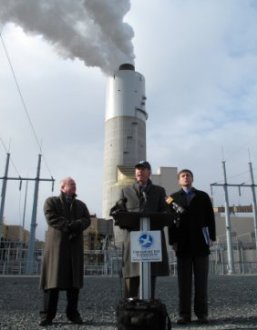 The Chesapeake Bay Foundation released a report that disputes any link between job loss and tighter environmental regulation. The group held a news conference at a power plant where jobs have been added as part of a two-year project installing "scrubbers" at coal-fired steam generators. Constellation Energy VP Paul Allen, CBF president William Baker, and study author Tom Pelton spoke at the event. The Chesapeake Bay Foundation released a report that disputes any link between job loss and tighter environmental regulation. The group held a news conference at a power plant where jobs have been added as part of a two-year project installing "scrubbers" at coal-fired steam generators. Constellation Energy VP Paul Allen, CBF president William Baker, and study author Tom Pelton spoke at the event. |
The Environmental Protection Agency is proposing new rules aimed at limiting the amount of carbon pollution coming from new power plants.
The standards, which would set separate limits for natural gas and coal power plants, are being called the first uniform national limits for new plants.
"Power plants are the single largest sources of carbon pollution," EPA Administrator Gina McCarthy said in remarks prepared for delivery at the National Press Club in Washington. "New power plants can minimize their carbon emissions by taking advantage of modern technologies. These technologies offer them a clear path forward, today and in the long-term."
New coal power plants and small natural gas plants would be limited to 1,100 pounds of C02 emissions per megawatt-hour. Larger natural gas plants would be limited to one thousand pounds a megawatt-hour.
These restrictions are slightly looser than a set first proposed in 2012. McCarthy said the new proposal factors in public feedback from public comments received last year.
Existing power plants are exempt from the proposed carbon regulation, but McCarthy said regulations on those plants will be proposed in June.
Sen. Joe Manchin, a Democrat who represents coal-rich West Virginia, criticized the administration as trying to hold the coal industry to "impossible standards"
"Never before has the federal government forced an industry to do something that is technologically impossible. Forcing coal to meet the same emissions standards as gas when experts know that the required technology is not operational on a commercial scale makes absolutely no sense and will have devastating impacts to the coal industry and our economy," he said in a written statement.
McCarthy said the EPA has a history of pollution standards driving technological development.
"The old rules may say we can't protect our environment and promote economic growth at the same time, but in America, we've always used new technologies, we've used science, we've used research and development and discovery to make the old rules obsolete," McCarthy said.
The president and CEO of the National Mining Association also had harsh words for the proposal.
"The regulation announced today by EPA effectively bans coal from America's power portfolio, leaving new power plants equipped with even the most efficient and environmentally advanced technologies out in the cold," said Hal Quinn, asserting that the EPA is "recklessly gambling with the nation's energy and economic future."
He said standards should be based on the best technology available today.
An EPA official briefing the media on the new clean air proposals Friday said that if they are finalized, the method of recouping costs associated with the new regulations would be determined by the industry. When pressed, the EPA official refused to say if the increased costs would be passed on to consumers.
The standards will be open for public comment for 60 days, during which time the agency said, it plans to hold public hearings.
CNN's Todd Sperry contributed to this report.






















































































































































































































































































































